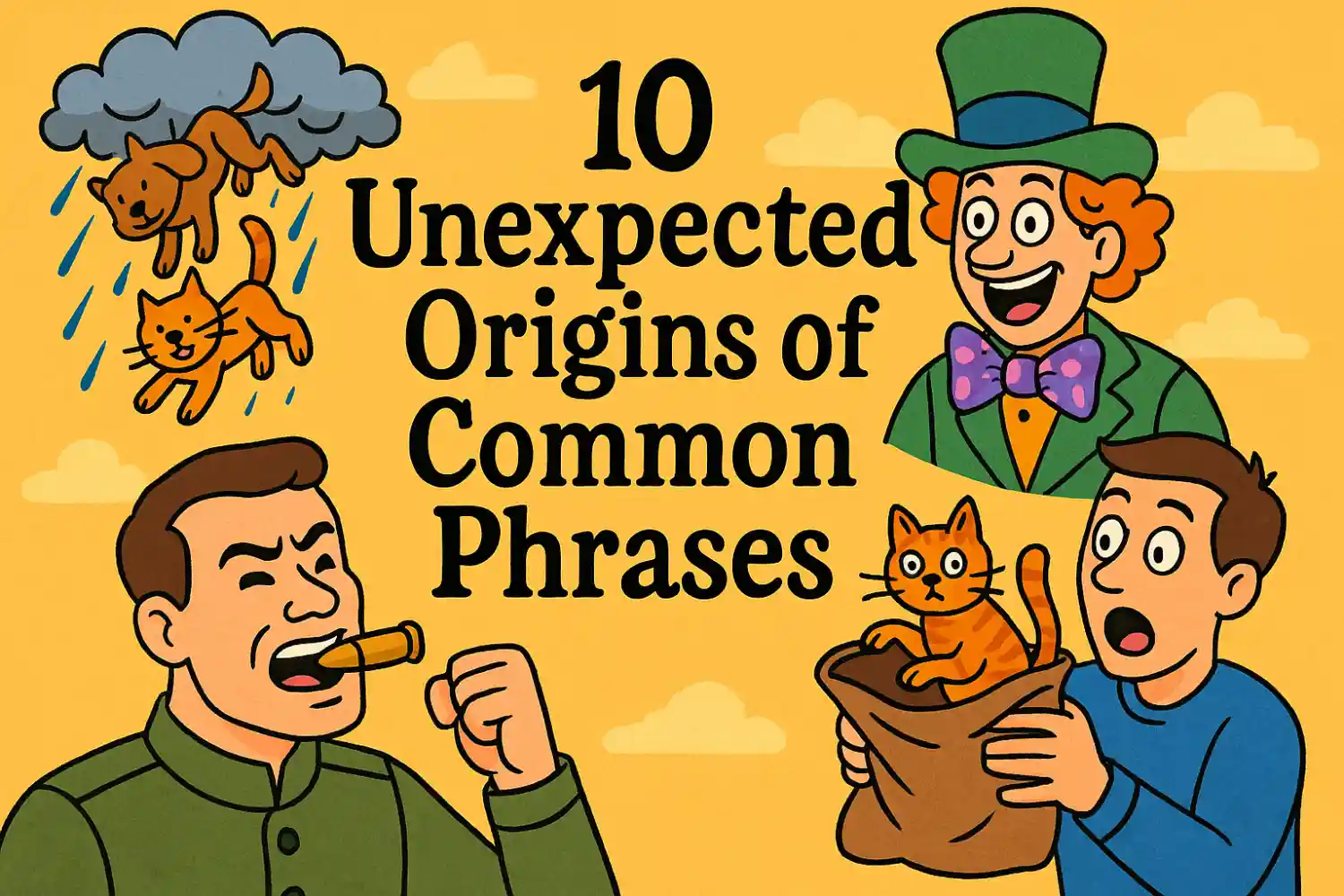10 Unexpected Origins of Common Phrases
We use them every day, often without thinking twice. Phrases like "raining cats and dogs" or "bite the bullet" are part of our casual conversations. But have you ever stopped to wonder where they actually came from? Many of these idioms have bizarre, dark, or downright unexpected origins. Let’s take a curious dive into the strange histories behind some of our favorite expressions.
1. Raining Cats and Dogs
Origin: 17th-century England
What It Really Means: Heavy rain
In the days of poor sanitation and open gutters, torrential rain would often carry debris—including dead animals—through the streets. People sometimes witnessed cats and dogs literally washing by in the floodwaters. Over time, this grim reality gave rise to the vivid phrase we now use to describe intense rain.
2. Bite the Bullet
Origin: Battlefield medicine in the 1800s
What It Really Means: Endure pain or hardship bravely
Before the advent of anesthesia, soldiers undergoing surgery were given a bullet to bite down on to help them tolerate the agony. It prevented them from biting their tongues and muffled screams. It was a literal act of courage that morphed into a metaphorical one.
3. Mad as a Hatter
Origin: 18th-19th century hat-making industry
What It Really Means: Completely insane
Hat makers used mercury nitrate in the felting process, exposing themselves to mercury poisoning. Symptoms included tremors, hallucinations, and erratic behavior—a condition that became known as "Mad Hatter Syndrome."
4. Kick the Bucket
Origin: Livestock slaughter or old English idioms
What It Really Means: To die
One theory suggests it comes from the practice of hanging animals from a beam or yoke (sometimes called a "bucket") when slaughtering them. The animals would often kick violently as they died. Another theory connects it to a Catholic custom involving a bucket used during death rituals.
5. Let the Cat Out of the Bag
Origin: Medieval market scams
What It Really Means: Reveal a secret
Dishonest traders would sometimes swap a piglet (which was valuable) with a cat (which was not) and tie it in a sack. If a buyer opened the sack and found the cat, the fraud was exposed. Hence, to "let the cat out of the bag" means to reveal a hidden truth.
6. Break the Ice
Origin: Trade and navigation
What It Really Means: Start a conversation or ease tension
In icy waters, small ships would go ahead of larger ones to break the ice and make passage possible. The phrase transitioned into social language, describing efforts to make others comfortable and open up dialogue.
7. Butter Someone Up
Origin: Ancient India
What It Really Means: Flatter someone to gain favor
In ancient Indian religious rituals, people would throw balls of clarified butter (ghee) at statues of gods to seek blessings. This act of offering transformed into a verbal idiom about giving compliments to win someone over.
8. Steal Someone’s Thunder
Origin: 18th-century theater
What It Really Means: Take credit for someone else’s idea
Playwright John Dennis invented a thunder machine for a play that flopped. Later, he discovered his technique being used in another successful production. He famously exclaimed, "They stole my thunder!" The phrase stuck.
9. Cost an Arm and a Leg
Origin: Portrait painting in the 18th century
What It Really Means: Extremely expensive
Some say that full-body portraits, which included arms and legs, were more expensive than headshots. So if you wanted your full limbs included in the painting, it could literally cost you "an arm and a leg."
10. Saved by the Bell
Origin: Possibly safety coffins (not just boxing)
What It Really Means: Rescued at the last moment
While it is widely used in boxing today, one theory points to 17th-century safety coffins, which were designed with bells in case someone was mistakenly buried alive. If the person rang the bell, they'd be "saved by the bell."
Final Thoughts
Language evolves, but the stories behind our idioms remain windows into history, culture, and sometimes absurdity. Next time you use one of these phrases, take a moment to appreciate the odd journey it took to become part of everyday speech.
Curious about more quirky phrase origins? Stay tuned for Part 2!
